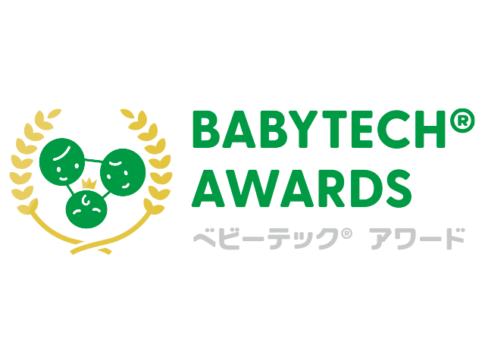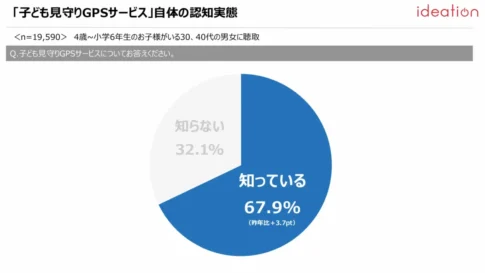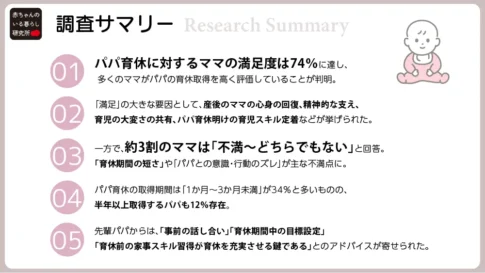- The following is content from the press release -
According to a Kewpie survey of 240 parents with children aged 3 to elementary school, approximately 67% of respondents answered that their children have a particular vegetable they dislike*1.
At Kewpie, we want children to enjoy eating vegetables, and we want to help parents who are troubled by their children's dislike of vegetables, so we have been working to solve the problems of vegetable dislike through various approaches. In this issue, we interviewed three people who continue to take on these challenges.

Photo (1): Hiroki Hirota (Dressing Team, Seasoning Department, Household Products Division, Kewpie Corporation)
Photo by: Asumi Oue (Taste Research Team, Evaluation and Analysis Research Department, Technical Solution Research Institute, Research and Development Division, Kewpie Corporation)
Photo㊨: Masako Hanyuda (Social & Nutrition Education Team, Public Relations & Group Communication Office, Kewpie Corporation)

1 According to Kewpie Co.
Survey population: 240 parents of children ages 3 to elementary school who eat salad with commercial dressing at least three times a week.
Survey period: March 17 - 24, 2024
Solving children's dislike of vegetables through "research and development
--You recently published some interesting research results. You have uncovered a part of the mechanism of how we perceive the bitter taste of bell peppers...?
Ohgami: At Kewpie, we have been conducting research on the mechanism of good taste for many years. We have been focusing on the bitterness of bell peppers for the past 10 years. This is because bell peppers were often cited as a vegetable that children did not like because of its bitterness, despite the fact that it is rich in nutrients and is a familiar vegetable on the dinner table. Previous research has shown that when bell peppers are sauteed with mayonnaise, the bitterness is less noticeable. Further research revealed that among the ingredients of mayonnaise-oil, egg, and vinegar-egg was more effective than egg white, and egg yolk was more effective than egg white.
It is difficult to objectively indicate the taste we perceive. This is because the human tongue perceives the ingredients in food in a complex manner. This time, in collaboration with the University of Tokyo, we have established a method to objectively measure the intensity of bitterness by creating cells that artificially mimic the tongue, and have succeeded in clarifying the mechanism by which we perceive the bitter taste of green peppers. We have also scientifically proven that egg yolk protein suppresses bitterness.
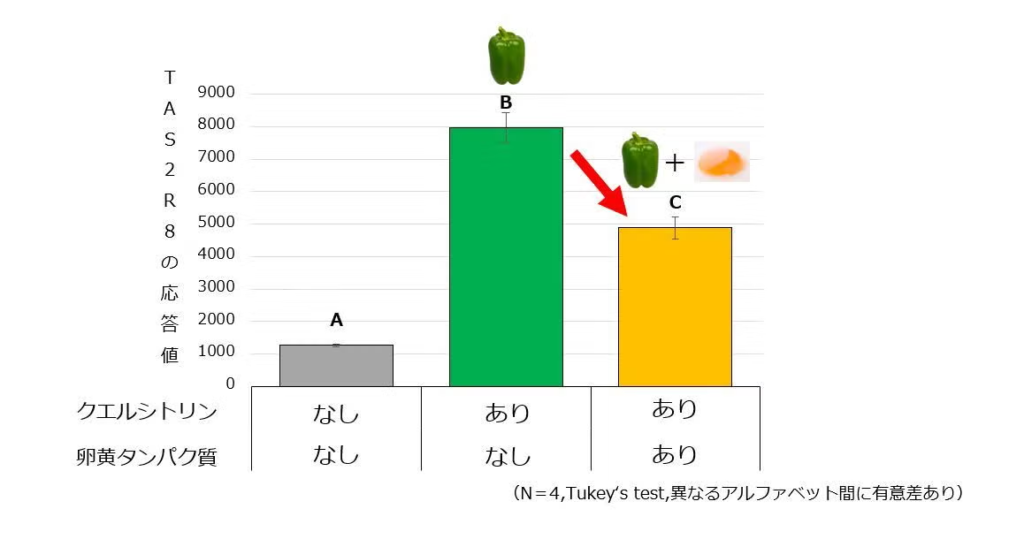
Figure: Bitter Taste Suppression Effect of Egg Yolk Protein by the Response Intensity of Bitter Taste Receptor "TAS2R8".
For more information, please see the release: Part of the Mechanism of Bitter Taste in Bell Peppers Elucidated
https://prtimes.jp/main/html/rd/p/000000502.000044559.html
--The results of this research may allow more children to learn to eat bitter peppers.
Ogami: Yes, that's right. However, the goal is not to make it possible to eat bitter vegetables. Bitter tastes often come naturally to us as we grow older with more food experience, and in fact, as an accent, they can be tasty. However,If you have a negative image of vegetables as a child, that they are bitter and not tasty, you may avoid them as an adult.It may be. To prevent that from happening,I would be happy if this research leads to a positive experience for children, "I was able to eat vegetables! I would be happy if this research leads to a positive experience for childrenIt is.

--I see, so positive experiences are important. By the way, does it work with anything other than mayonnaise and eggs?
Hirota:As a matter of fact, some studies have shown that simply adding dressing to vegetables suppresses their bitter taste and makes them easier to eat. Vegetables are essential to a healthy diet, but it is known that nearly 70% of children have a weakness for some vegetables*1,Many parents are troubled by their children's dislike of vegetables.It is. It is sad when vegetables are left on the table. In such cases,We recommend using dressings to make eating vegetables fun and tasty!It is.
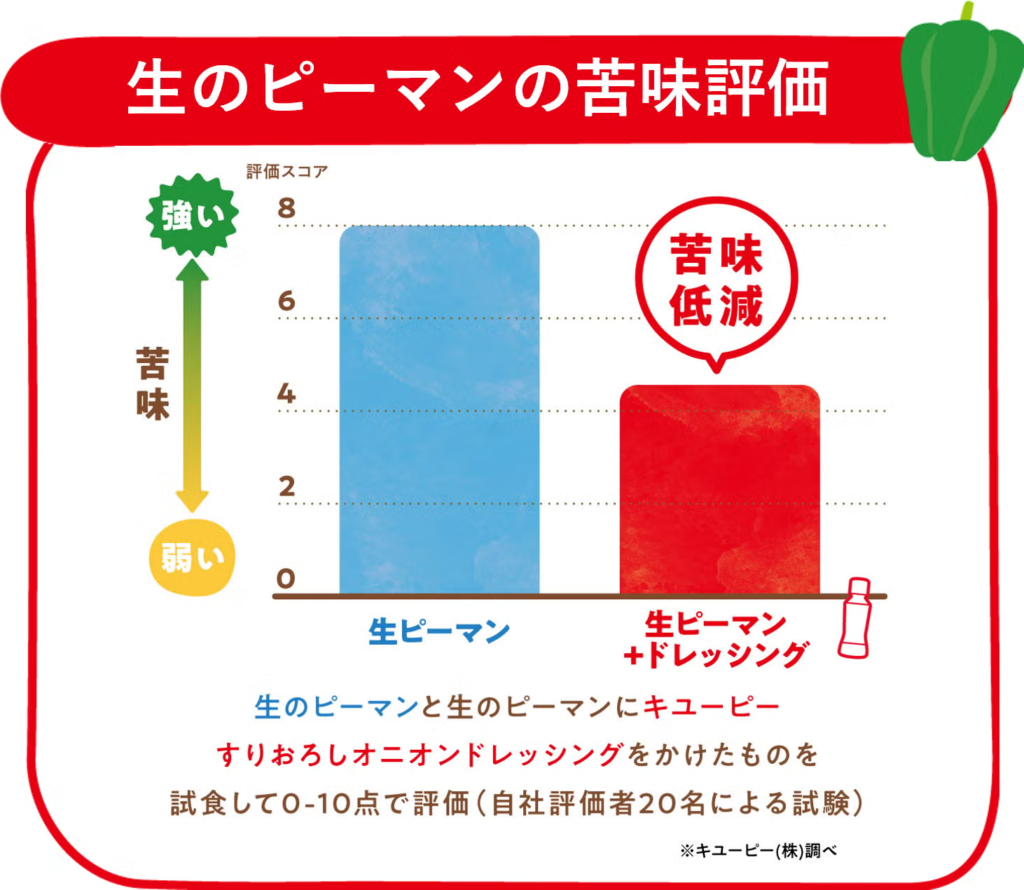
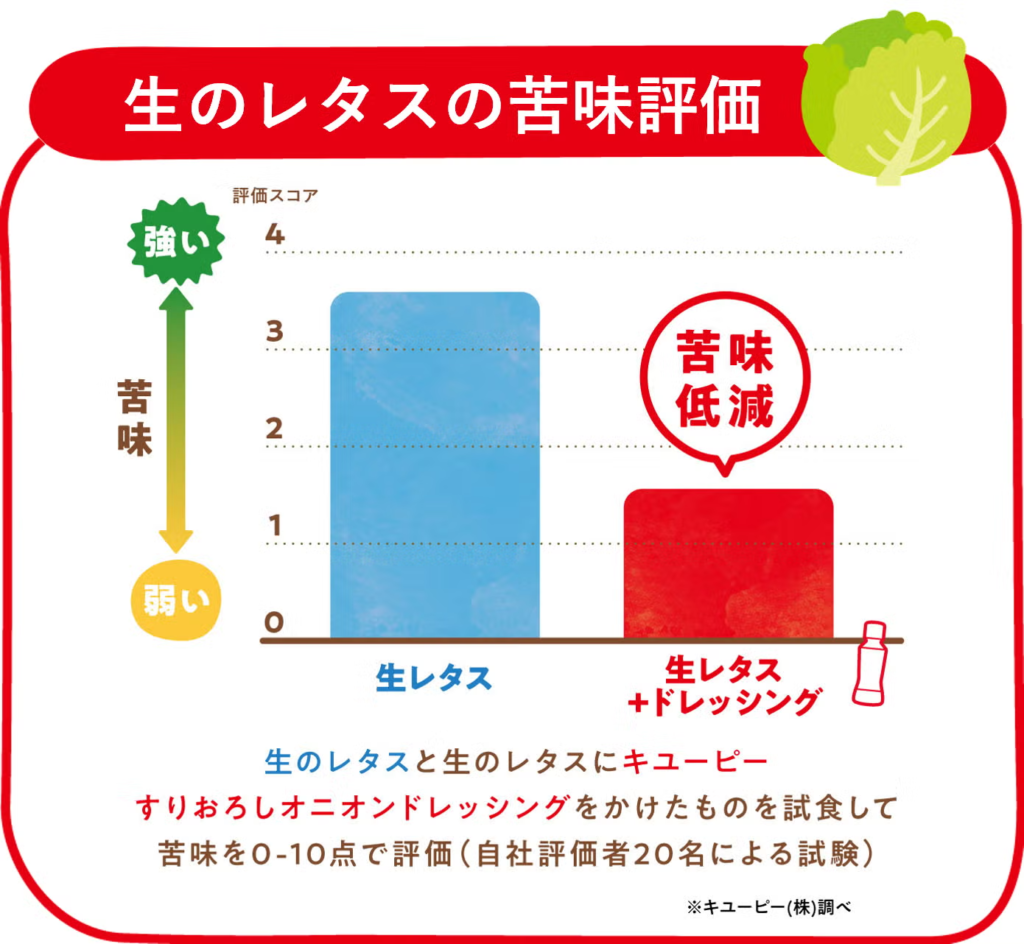
Providing "hands-on experience" to solve children's dislike of vegetables
--and the dressing! It's amazing. I hope you get a chance to let people know how well this works.
Hirota:At "Yasai na Tomodachi Farm," a vegetable complex in Fukaya City, Saitama Prefecture, we offer a vegetable harvesting experience. Children are happy to eat vegetables they don't like when they harvest them themselves. The same goes for the cooking experience. When they cook vegetables by themselves, they naturally eat them deliciously.
We want people to have the same fun experience in their homes, and so we are launching a campaign*2 for dressings that delivers the experience of harvesting vegetables at home, starting in 2021. In this campaign, we are giving away experience kits that allow people to grow and harvest vegetables perfect for salads at home. This year, in addition to the harvesting experience kit, we also offered a choice of aprons for parents and children that make them want to cook. For salads, tearing lettuce leaves or removing the stems from mini-tomatoes is not difficult, even for small children. We encourage you to try it with your favorite dressing. Recipes for children and how to use the dressing are also introduced in the campaign and on the official website.If you made the salad yourself, you will surely want to eat it. We hope this experience will help you become familiar with vegetables.It is.
2 "Kewpie Vegetable Eating Campaign" website
https://www.kewpie.co.jp/cp/202406-dressing
Kewpie Aohata News Release 2024 No.41
https://prtimes.jp/main/html/rd/p/000000520.000044559.html

Hanyuda: Of course, the experience does not magically enable you to eat the vegetables you don't like right away.Even if you can't eat at the experience, the memories of the fun you had will give you the boost you need to eat it someday!It is!
To create an opportunity for children to learn to like vegetables, an event is planned in June at Mayo Terrace, a Kewpie observation facility (Chofu City, Tokyo), where children will be challenged to cook bell peppers, a typical vegetable that they are not fond of. On the day of the event, we will work with participating parents and children to create a menu that reduces the bitterness of bell peppers. Since the recipe is based on research results, we expect that even children who do not like green peppers will be able to enjoy it.Whether you can eat them or not, I would be happy if I could trigger even a small interest in vegetables.It is.
--I think that "hands-on experience" is the first step to becoming a fan of vegetables. Does the "mayonnaise class" that Kewpie has been conducting for many years provide exactly such "hands-on experience"?
Hanyuda: Yes, that's right. The mayonnaise class is one of Kewpie's important dietary education activities that we have continued since 2002. The instructors are Kewpie Group employees who have acquired the "Mayo Star" in-house certification. The instructors visit elementary schools and give lectures on mayonnaise and the importance of vegetables, and then have the students try their hand at making mayonnaise. The mayonnaise they make is dipped in vegetables and tasted at the end. Even elementary school students who said "I don't want to eat vegetables" before the program started often smile and say, "I could eat it with my friends! and smiles on their faces. The teachers are also surprised to see this, saying, "They usually don't eat much! I, as an instructor, am also surprised by the children's smiles. I, as an instructor, am also empowered by the children and am moved to tears by their willingness to take on challenges.
The mayonnaise class has been well received, and by 2023, a total of 114,000 elementary school students will have participated in the class.The company is now in the process of
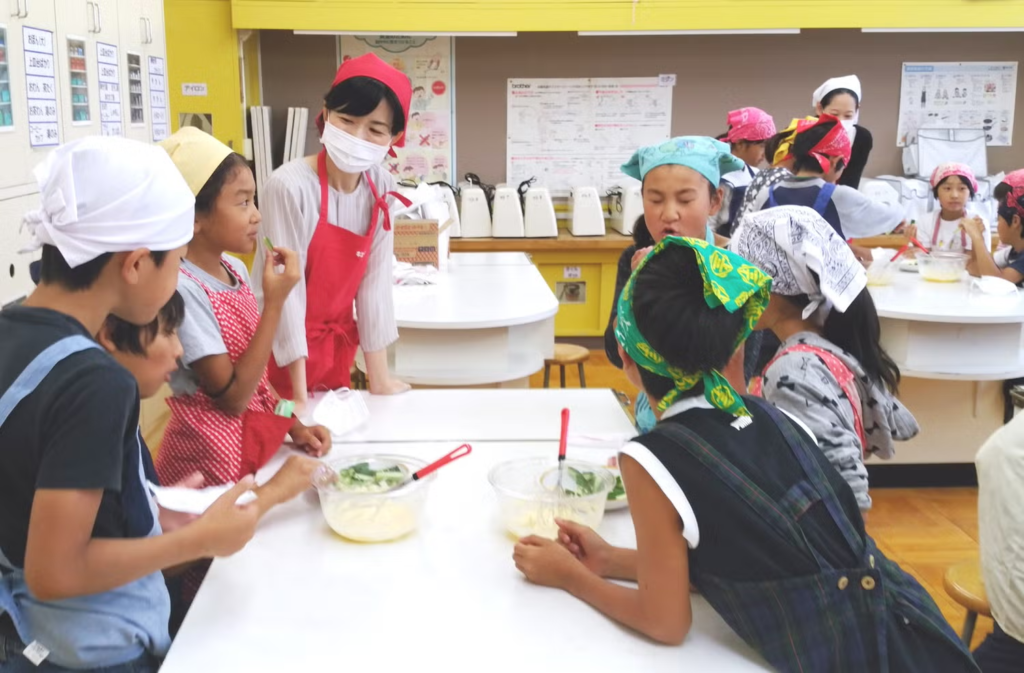
--you have held many of them! Do you have any memorable episodes?
Hirota:I, too, learned about this activity when I was a new employee and requested to become a Mayo Star! The children who tried the vegetables in support of their friends, the ones who ate just a little in the fun atmosphere, all seemed very happy about the experience of being able to eat. I later heard from the teacher that everyone was so happy that they reported it to their families as well. This experience has led me to my current desire to "make people smile with vegetables.
We also continue to encourage children attending kindergartens and nursery schools to try our dressings along with vegetable recipes for children. Delivered to approximately 340,000 children to dateI have been doing this for a long time. The dressing we gave them is "my dressing! and they are eating it with great care.
recentlyParticularly popular is the "Vegetable Tasty Tare" series launched last year! Tare" series. We have received a series of comments from our Customer Service Center that children who used to rarely eat salad have started eating salad at every meal thanks to "Vegetables are good! Tare" has made them eat salad at every meal, which is very encouraging.
We want to convey the importance and joy of vegetables and bring smiles to children's faces. The challenge continues.
--What is the best way to eat vegetables for children who don't like them?
Hirota:As for recipes that allow you to "experience" making your own food, we have a recipe calledRibbon salad with carrot and cucumberis recommended. Even children can easily help with cooking using a peeler, and the ribbon-like shape of ordinary vegetables makes them look gorgeous.
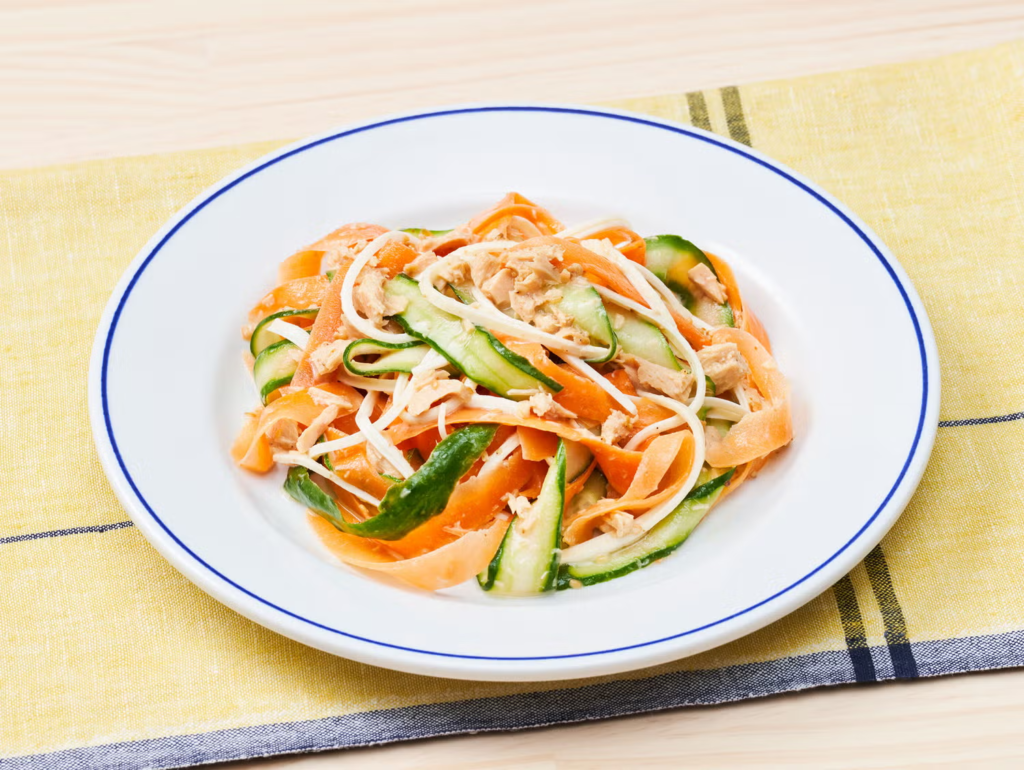
If your child doesn't like the bitter taste of vegetables, you can use "Salad with lettuce, ham and croutonsI also recommend the "crouton" dish. The crunchy texture of the croutons adds a delicious accent to the dish, and it is easy to prepare as all you have to do is tear up the lettuce and ham, top with the croutons, and pour the dressing over the top.
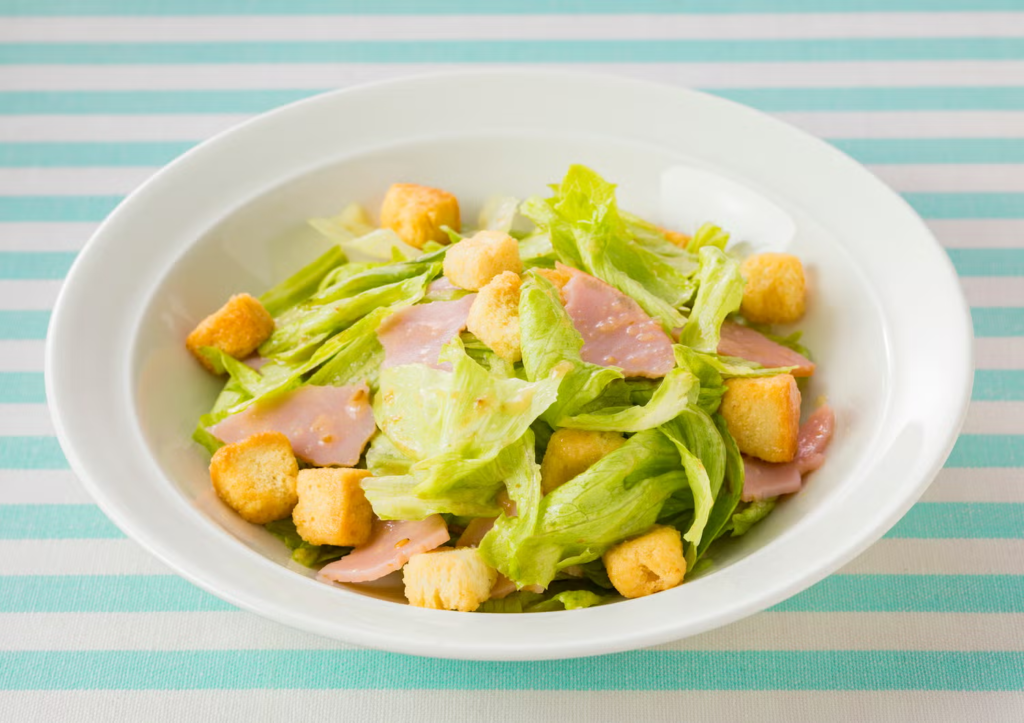
--I am sure that your activities will continue further. What is your enthusiasm for the future?
Hanyuda: Vegetables contain many vitamins, minerals, and dietary fiber that regulate body condition and are essential for a well-balanced diet. We have been carrying out a variety of activities in the hope that children will become more familiar with vegetables. In addition to developing products and proposing recipes that make vegetables easier to eat, Kewpie provides information on vegetables and holds events.
I would like to continue to support mental and physical health and bring many smiles to children's faces by conveying the importance and joy of vegetables.We think that this is a good idea.

(Reference) Kewpie's major dietary education activities and research achievements related to vegetables
2002 Mayonnaise Class" started as a delivery class
2011 Mayonnaise Classroom" encourages elementary school students to make an effort to eat vegetables" presented at the 5th Japan Society for Nutrition Education Conference.
2015 Presentation on "Effect of Mayonnaise on Reducing Bitterness of Vegetables" at the Japanese Society of Culinary Science, 2015
2016 The possibility that the bitterness reduction effect of mayonnaise on vegetables is enhanced by (1) the egg yolk's greater bitterness reduction effect, (2) the egg yolk's acid denaturation, and (3) the mayonnaise's fine emulsification, was suggested and presented at the 2008 Japanese Culinary Arts Association Conference.
■Reference Release:https://www.kewpie.com/newsrelease/2016/121/
Year 2021 Kewpie launches "Let's Enjoy Vegetables with Children" website on its official website to encourage children to enjoy eating vegetables in a tasty and fun way.
The "Let's Enjoy Vegetables with Children" website:https://www.kewpie.co.jp/kids_yasai/
■Reference Release:https://www.kewpie.com/newsrelease/2021/2283/
Year 2022 Research study conducted in collaboration with Shirayuri Women's University reveals that cooking vegetable dishes together with parents and children has a positive effect on children's psychological development, and presented at the 10th Annual Conference of the Japanese Society for Nutrition Education.
■Reference Release:https://www.kewpie.com/newsrelease/2022/2573/
Year 2023 # Gochiso Shama Challenge" is a food education project to provide children with the success experience of "I could eat vegetables! # Gochiso Shama Challenge" is a food education project that provides children with the successful experience of "I could eat vegetables!
■Reference Release:https://www.kewpie.com/newsrelease/2023/2997/
Year 2024 Elucidated the mechanism of bitter taste of green pepper and suggested that egg yolk protein may suppress the bitter taste of green pepper.
■Reference Release:https://www.kewpie.com/newsrelease/2024/3331/







